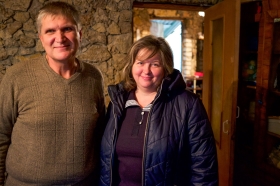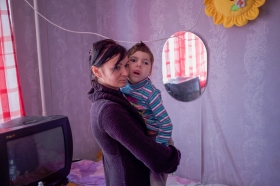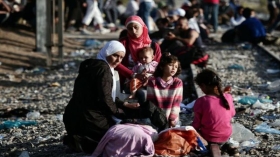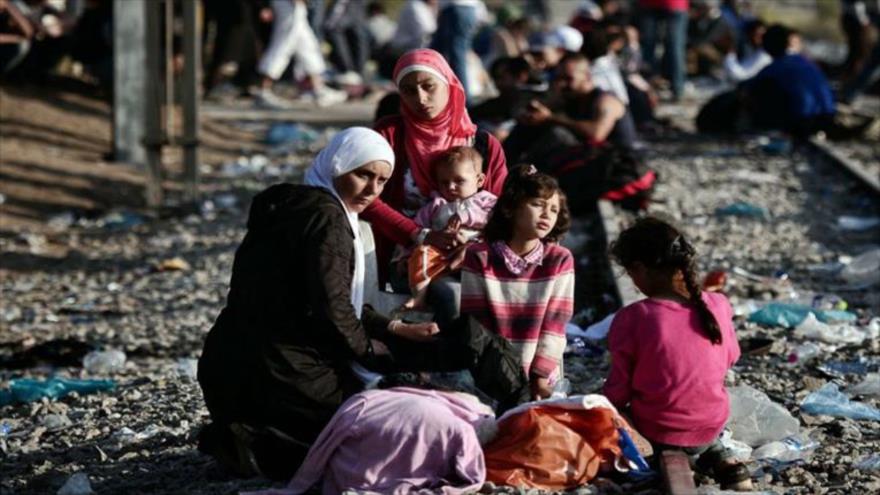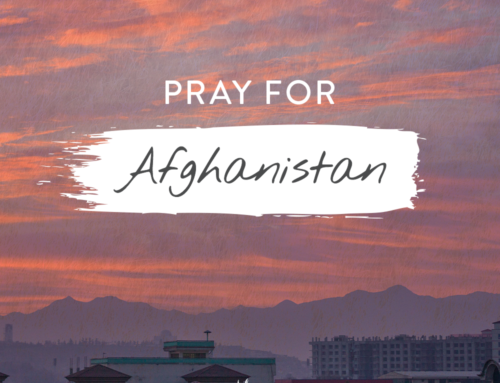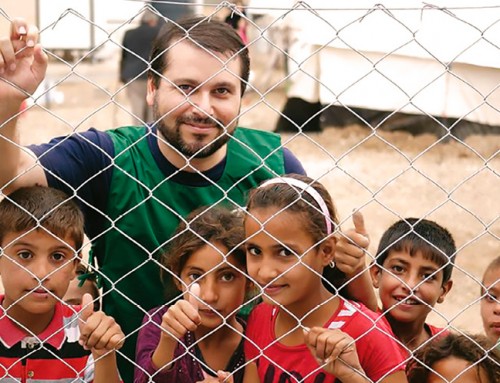Words and Photos by Brandon Sipes
If you have driven through the flat plains of the Midwest in the United States, you can understand why so many people call this “flyover country.” There is often not much to see, especially during the winter months. During the summer, it’s hot and the fields are full of tall cornstalks, but as the months go by, November hardens into December. Then the ground starts to freeze and crack, and those of us who live here see miles of harvested corn fields as we drive by. It seems bleak, all those shattered remains of stalks.
This is why it seemed familiar to me to be in Ukraine in late October of last year: the landscape, the climate, and the layering of clothes to insulate against the cold. I traveled with others toward Odessa, a major city on the Black Sea (which in Greek and Latin means “the sea that welcomes strangers”). We wanted to visit the Nazarene church in Odessa and see their work with people who had been displaced by conflict in eastern Ukraine.
Displaced by Conflict
The historical origins of the conflict are long and complex, but within the past several years, Ukraine has seen a great deal of violent conflict, primarily with Russia. In late 2013, an internal political crisis led to a revolution in Ukraine. Dozens of citizens were killed, and the impact reverberated eastward, toward Russia. Tensions between the two countries continued to rise, and military operations escalated until violence had overcome the eastern Ukrainian provinces of Donetsk and Luhansk.
Fast forward two years, and the ongoing violence and conflict continues to cause grief and suffering for the millions caught in these regions. Thousands have been killed, tens of thousands have been injured, and more than 2 million have been displaced from their homes. Many of those who are considered internally displaced persons (IDPs) have landed in Odessa.
In Odessa, I met the pastor of the local Nazarene church there, Nabil Babbeisi, his wife, Natasha, and their ebullient 2-year-old daughter. Their home felt warm and inviting, and their hospitality shone. Nabil is a transplant from Syria, having arrived in Ukraine 20 years ago. He spoke for some time about his home country, the current war there, and how his heart breaks for those who have suffered so much. He later laughed as he told the story of how he became a Christian “at an outdoor revival meeting where the preacher came off the stage, cornered me against the wall, and asked if I wanted to know Jesus.”
Natasha’s story is also one of distance traveled and hardships overcome. Her parents died when she was 9, and she was placed in foster care while being considered for an orphanage. Normally, orphanages don’t take in children approaching teenage years because it’s hard to find adoptive families for older children. However, the staff knew that Natasha would very likely become a victim of human trafficking if they did not take her in. A few years later, Natasha asked to be sent “as far away as possible” from the place she knew, which is how she ended up in Odessa.
There, she became a Christian and moved into the home of a couple whose son had recently died. The one time she became overwhelmed with emotion while recounting her story was as she told of the pain those parents felt over the loss of their son. Stopping to collect herself, she said, “I know God placed me with them to comfort them.”
It must be this comforting presence that draws their congregation to Natasha and Nabil and allows them to have such impact on the lives of others who have also traveled far and suffered much.
Serving From Common Ground
Another couple at the church, Sasha and Ira, lead a ministry to people who are displaced in Odessa. The pair are, themselves, in Odessa because they were displaced from Luhansk. Sasha, a former Ukrainian soldier, says he had been admitted to a hospital for surgery when it came under attack. Doctors fled, and nurses moved patients into hallways for more safety. When Ira got to the hospital, she helped Sasha into the car while he was still staggering under the effects of anesthesia. She started driving southwest. Sasha says he woke up in Odessa.
Sasha and Ira’s story is similar to those they serve: all fleeing violence and persecution, feeling danger at their heels as they grab what little they can from their homes. They arrive in an unfamiliar place, where in many cases they are not welcomed with open arms. To add to the depth of their struggle, most of the displaced people Sasha and Ira serve have at least one family member with profound intellectual or physical disabilities. Many are in need of medications or medical equipment, such as wheelchairs, which are often out of reach.
Sasha and Ira arrange transportation and help with visits to medical facilities. They act as social workers, helping people navigate the bureaucracy required to receive assistance or even legal papers, which sometimes requires a 10-hour round trip drive to Kyiv, Ukraine’s capital city. They deliver food, medicines, blankets, and household supplies. They drive to several housing sites each day to check on families, praying with them and offering comfort.
Nabil, Sasha, and Ira introduced me to a young woman named Tanya and her 10-year-old daughter, Darina*. They have been in Odessa since March 2016. Darina has a severe case of cerebral palsy and experiences epileptic seizures. She has very little control over her muscles and is unable to sit upright or roll onto her side. Darina spends most of her days lying in bed. Tanya explains that in part it’s because “I cannot let her legs hang below her midsection because of a circulation issue.”
Darina’s eyes dance, though, when she looks out the window or follows along with the books her mom reads to her. Tanya wishes she could afford the medications Darina needs. She wishes she could get an appropriate wheelchair so her daughter could travel outside and keep her legs elevated properly.
“The cost is too much,” she says.
The stipend from the United Nations that she receives as an internally displaced person barely covers her rent and utility expenses. She would like to work, but employment is hard to find for those who aren’t openly welcome in the first place. Plus, who would watch her daughter while she goes to work? Some of this would be easier if Darina’s father were around. He left a long time ago, succumbing to the pressure of having a daughter with disabilities. The associated social stigma in Ukraine is pervasive, creating a disturbing level of discrimination and exclusion for individuals living with disabilities.
The buildings I visited were neglected badly and many had no heat, despite the fact that the displaced people living there are paying rent to a landlord. In mid-October it was already very cold inside. Another building, an orphanage abandoned for 30 years, lacked water and electricity as well.
When Sasha and Ira got to Odessa, they moved into a Soviet-style block building and slept on an air mattress for 86 days. “We have been here [in Odessa] three years, but it feels like ten,” Sasha says.
Sasha and Ira now live in a home that Pastor Nabil owns. Sasha talks about his past crimes and sins and how he didn’t know how lost he was until he saw the truth. He looks Nabil in the eye and thanks him for showing what God’s love can do in a person’s life.
“I have many degrees,” Sasha says to his pastor, “but in your teaching I finally learned something new.”
God’s love has given Sasha and Ira the desire to work with others who have been displaced.
Affirming Dignity
People who are displaced almost always want to go home. They want to go back to the life they knew, to the jobs they had, and to the family and friends they left behind. But for many the road is literally blocked, and across the eastern regions of Ukraine, the violence prevents people from returning. An often unrecognized hardship of being displaced is the loss of dignity and contribution people felt through their vocation and the disconnection they feel apart from family, friends, and community. Those who are displaced suffer not only because they have lost so much, but also because they have so much to give and almost no way to give it.
The Nazarene church in Odessa is focused not only on meeting needs, but also on providing opportunities for displaced individuals to contribute to others and regain a sense of purpose and dignity. The plan for the home where Sasha and Ira live is to turn empty spaces into housing for other displaced families and to create a welding and iron workshop, where people can learn or hone skills and build a legitimate business.
The space in the building is rough and will probably remain so as they transition it into use for welding. It will take financial resources from the church, the efforts and resources of those who are displaced, and sacrifices all around to make the workshop a reality. But as I stood in that dark space, the light filtering in through the gaps in the boards and my breath rolling out into clouds, I could begin to imagine the sparks flying off the welding torch and how much warmth might actually fill that space.
*Children’s names are changed for their protection.
Brandon Sipes is a program coordinator for Nazarene Compassionate Ministries, Inc., focusing on youth mentoring, conflict mediation, and refugee support. He and his wife, an ordained Nazarene elder and pastor, live in Ohio with their two children.
